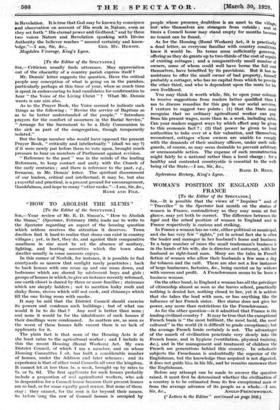"HOW , TO ABOLISH THE SLUMS " [To the Editor
of the SPECTATOR.]
Sta,—Your review of Mr. E. -D. Simon's, " How to Abolish the Shmris,", (Spectator, February 16th) leads me to write to the Spectator regarding an aspect of the housing question which seldom receives the attention it deserves. Town dwellers find it hard to realize that slums can exist in country villages ; yet, in fact, they do, and against their comparative smallness in size must be set the absence of sanitary, lighting, and heating amenities which the town slum dweller usually in some measure enjoys.
In this corner of Norfolk, for instance, it is possible to find courtyards so narrow that sunlight rarely penetrates ; back to back houses with one room up and one room down, and bedrooms which are shared by adolescent boys and girls ; groups of houses in which, to give an instance recently reformed, one earth closet is shared by three or more families ; staircases which are simply ladders ; not to mention leaky roofs and shaky floors, stoves which will not cook, and chimneys which fill the one living room with smoke.
It may be said that the District Council should exercise its powers and condemn such buildings ; but of what use would it be to do that ? Any roof is better than none ; and none it would be for the inhabitants of such houses if their dwellings were condemned. As matters are, as soon as the worst of these houses falls vacant there is no lack of applicants for it.
The plain fact is that none of the Housing Acts is of
the least value to the agricultural worker ; and I include in this the recent Housing (Rural Workers) Act. My own District Council, of which I am a member, and on whose Housing Committee I sit, has built a considerable number of houses, under the Addison and later schemes ; and its experience is that of other rural Councils all-over:the kingdom. It cannot let at less than 5s. a week, brought- up by rates to 7s. or 7s. 6d. The first applicants for such houses probably include a proportion of real agricultural workers, who ask in desperation for a Council house because their present homes are so bad, or for some equally good reason. But none of them stay ; they cannot, for the rent is far beyond their means. So before song the row of Council houses is occupied by people whose presence doubtless is an asset to the village, but'- who- themselves are strangers from outside ; and at times a Council house may stand empty for months because
no tenant can be found. -
As for the Housing (Rural Workers) Act, it is practically a dead letter, as everyone familiar with country conditions knew it would be. Its terms seem sufficiently genesous, offering as they do grants up to two-thirds of the cost of repairs of existing cottages ; and a comparatively small number of owners, some of whom could well have borne the full oust themselves, have benefited by its provisions. But it has no assistance to offer the small owner of bad properti, himself probably a cottager, who has no capital from which to provide ' the other third, and who is dependent upon the rents for his own livelihood.'
You may think it worth while, Sir, to open your columns to receive suggestions from readers better qualified than am to discuss remedies for this gap in our social services, I venture to suggest two points : (1) that the State must recognize that no ordinary agricultural worker can pay from his present wages, more than 4s. a week, including rates. Can your readers suggest ways by which effect may be given to this economic fact ? ; (2) that power be given to local authorities to take over at a fair valuation, and themselves, reconstruct, cottages' whose owners are unable to comply with the demands of their sanitary officers, under such safe- guards, of course, as may seem desirable to prevent arbitrary or unreasonable action. The expense of such reconstruction might fairly be a national rather than a local charge ; for a healthy and contented countryside is essential to the well- being of the State.—I am, Sir, &e.,


















































 Previous page
Previous page